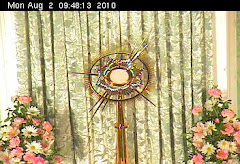
Have you seen this excellent article with Mgr Guido Marini, the Papal Master of Ceremonies?
As Mgr Marini says, ' . . . the celebrations the Holy Father presides over are to be the points of reference for the whole Church. The Pope is the highest priest, the one who offers the sacrifice of the Church, the one who shows the liturgical teaching through celebrations – the point of reference for all.'
I wonder what you think?
Have you noticed any differences in the way that Pope Benedict presides over the liturgy?
How would you feel if, for example, Mass were sometimes celebrated ad orientem, in other words, facing East, in the same direction as the congregation?
Would this help you to focus on the sacrifice of the Mass rather than on the celebrant himself?
Have you noticed any differences in the way that Pope Benedict presides over the liturgy?
How would you feel if, for example, Mass were sometimes celebrated ad orientem, in other words, facing East, in the same direction as the congregation?
Would this help you to focus on the sacrifice of the Mass rather than on the celebrant himself?
I would be interested to hear your views?









6 comments:
As someone fortunate enough to be able to attend Mass in my parish both ad orientem and versus populum, I can say that there is definitely a more spiritual element when Mass is celebrated "facing God."
There is a distinct sense that the priest is praying in the same direction as us, and, although he is mediating between us and God, he becomes less of a focus. When Mass is celebrated facing the people, it appears to be more of a conversation between priest and people...
The most beautiful part of the mass is the consacration,nothing on this earth can replace or measure up to it!So whether the priest faces the people or the east,we can still unite with the Greatest miracle in the Universe!
I MUCH prefer the priest to face the same way as the rest of us. It is difficult to think about the Mass while watching the priest's face, which is what we naturally do when faced with another human being - I have to make an effort not to.
I would like him to face the people is when reading the Epistle and Gospel - I would like to hear, whether in Latin or English.
Well I am in a minority here having read the comments to date, but I have vivid memories as a child of Mass being 'something' celebrated by the priest with the choir singing lengthy motets - all of it seemingly irrespective of the laity who were passive onlookers.
Mass celebrated facing the people promotes a greater
inclusiveness - and a responsibility on the part of the congregation to actively participate thus promoting a feeling that it is desirous for them to be there.
Picking up on some other points from the original article, I do enjoy the additional silences and time for personal prayer and meditation. The silence at times is awesome.
As for receiving communion kneeling - I can accept that this probably demonstrates a greater sense of worship but surely it is what is happening inside the recipient's head and soul that really matters whether standing or kneeling.
I would be very keen to attend Mass ad orientum at the parish of St Ann's if it were to introduce it. Every Mass that I have ever attended ad orientum (and using Latin) has been deeply spiritual and focused on the Miracle of the Altar. I am all for receiving Jesus on the tongue and on my knees - isn't that the best way to reverence the Most Holy Sacrament of the Altar?
A couple of thoughts:
An Anglican neighbour attended a funeral in our Catholic church. Afterwards she remarked: "Believing what you believe, I really cannot understand how you can possibly receive Holy Communion standing up." For once in my life I was speechless!
A now-retired priest of the Westminster diocese once opined that his preference was to say the prayers directed at God to be said ad orientem and those addressed to the people - the scripture readings for example - to be said facing the people. Makes sense to me...
Post a Comment